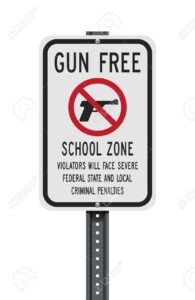Last week’s blog about gun sales stimulated some peripheral discussion about training, concealed carry permits, and liability. This week’s blog is a follow-up to briefly address some of the issues and questions that came from it. Or, simply put, this is Part II of last week’s blog.
Concealed Carry for Law Enforcement
Active-duty or honorably retired law enforcement officers who are permitted by their agencies to carry concealed weapons can legally do so in all fifty states, thanks to the Law Enforcement Officers Safety Act of 2004, known as HR 218. However, there are some requirements that need to be met, and some caveats to be aware of and to consider.
 For example, there are restrictions on carrying a firearm in some county, state, or federal buildings or properties. There are also the restrictions set in place by the Gun-Free School Zone Act of 1990, authored by two democrat congressmen and signed into law by President George H. W. Bush, which amazingly has no exception for off-duty or retired police officers. Given the fact there have been twenty-two school shootings since the law was enacted, it appears to be—as most pro-gun advocates could have predicted—to have been nothing more than another ineffective feel-good measure. These “gun-free” laws only deter law-abiding citizens, those who might be able to stop a deranged gunman. Clearly, the murderer is undeterred by gun laws. In fact, one could argue that they are encouraged to commit their crimes in just such “gun-free zones.”
For example, there are restrictions on carrying a firearm in some county, state, or federal buildings or properties. There are also the restrictions set in place by the Gun-Free School Zone Act of 1990, authored by two democrat congressmen and signed into law by President George H. W. Bush, which amazingly has no exception for off-duty or retired police officers. Given the fact there have been twenty-two school shootings since the law was enacted, it appears to be—as most pro-gun advocates could have predicted—to have been nothing more than another ineffective feel-good measure. These “gun-free” laws only deter law-abiding citizens, those who might be able to stop a deranged gunman. Clearly, the murderer is undeterred by gun laws. In fact, one could argue that they are encouraged to commit their crimes in just such “gun-free zones.”
There are 10-round gun magazine restrictions in California, Connecticut, and New York, and again, law enforcement officers carrying weapons in accordance with HR 218 are not exempt from them.
The point is, law enforcement officers need to be aware of such restrictions so that they are not unknowingly violating laws. A good article detailing the various restrictions can be found here.
Concealed Carry for Civilians
For civilians, some states allow for concealed carry when certain criteria are met and one becomes licensed to do so.
States are divided into three groups: Shall Issue, May Issue, and Constitutional Carry. USAcarry.com provides details of these classifications.
 There are certain states that have reciprocity laws allowing those licensed in other states to be able to legally carry a concealed firearm in the reciprocating state. There are currently 14 states that allow its law-abiding adult citizens to carry concealed weapons without any permit (Constitutional Carry); my home state of Idaho is one of them.
There are certain states that have reciprocity laws allowing those licensed in other states to be able to legally carry a concealed firearm in the reciprocating state. There are currently 14 states that allow its law-abiding adult citizens to carry concealed weapons without any permit (Constitutional Carry); my home state of Idaho is one of them.
Amazingly (I say in jest), citizens in this well-armed state are not going around shooting one another, nor have the radical elements of our society chosen our cities for their lawless, violent protests. The few protests that have taken place in cities such as Boise have remained civil, likely due to the overwhelming counter-protests of law-abiding, gun-carrying citizens, there to see to it that we do not become Portland.
For details on civilian concealed carry permits and state by state laws and regulations, Guns to Carry is a good resource.
Various State Laws
California is a “may-issue” state, meaning that the police chiefs and sheriffs of the various cities and counties have the ability to issue concealed weapons permits. In Los Angeles County, the odds of a regular citizen receiving a concealed weapon permit are equal to winning its state lottery. Other, more rural counties are more willing to issue—or should I say, their sheriffs and police chiefs are more likely to issue permits.
 The laws of carrying concealed weapons while consuming alcohol vary from state to state. Some states mandate that you will not carry a firearm when consuming alcohol, while others are more reasonable and only restrict against carrying a firearm while intoxicated. Essentially, if you can legally drive, you are probably okay (in those states) carrying your weapon. United States Concealed Carry Association (USCCA) offers a comprehensive list of the various states and their restrictions here.
The laws of carrying concealed weapons while consuming alcohol vary from state to state. Some states mandate that you will not carry a firearm when consuming alcohol, while others are more reasonable and only restrict against carrying a firearm while intoxicated. Essentially, if you can legally drive, you are probably okay (in those states) carrying your weapon. United States Concealed Carry Association (USCCA) offers a comprehensive list of the various states and their restrictions here.
For law enforcement carrying under the umbrella of HR 218, annual qualifications are required, and training is presumed to have taken place regularly throughout their careers.
As for civilians, there are many classes available where one can be trained and educated, and upon successful completion, the individual will receive certification that will allow the governing agency in their home state and county to issue a permit, according to that state’s statutes relative to the matter.
Concealed Carry Liability
Whether or not you have a background in law enforcement—and even if you are professionally trained in the use of firearms—you need to familiarize yourself with the laws of your state if you plan to carry a weapon for personal defense. This is imperative. I also recommend obtaining liability insurance from one of the several companies that offer such coverage.
 I recently joined the USCCA, signing up for their top-tier coverage plan, the Elite package. It costs me $47 per month, plus an extra $13 per month to include my spouse, who also carries a weapon. Sixty bucks a month is cheap insurance when it offers $2 million in coverage along with attorneys at the ready to defend you, should you be charged with a crime if forced to use your weapon in self-defense. With this subscription, I will also receive their eight issues per year of their Concealed Carry magazine, unlimited access to training videos, limited access to experts and attorneys through interactive webinars, guides to training classes, and experts in my area, and more. To me, this is a great value in today’s world.
I recently joined the USCCA, signing up for their top-tier coverage plan, the Elite package. It costs me $47 per month, plus an extra $13 per month to include my spouse, who also carries a weapon. Sixty bucks a month is cheap insurance when it offers $2 million in coverage along with attorneys at the ready to defend you, should you be charged with a crime if forced to use your weapon in self-defense. With this subscription, I will also receive their eight issues per year of their Concealed Carry magazine, unlimited access to training videos, limited access to experts and attorneys through interactive webinars, guides to training classes, and experts in my area, and more. To me, this is a great value in today’s world.
Friends of the Concealed Carry Community
I encourage everyone who is interested in protecting our Second Amendment rights to join the NRA. My family and I are lifetime members. There is no single greater advocate with more influence in D.C. than the NRA.
If you didn’t know it, Glock (my gun of choice) offers special prices to law enforcement through its Blue Label program. It is simple to buy directly from Glock, or you can search their site to find a local gun dealer who participates in this program.
I mentioned the USCCA, but there are a few other alternatives. One being CCW Safe, an organization one of my good friends just switched over to. Here is a good article comparing the two.
 As for USCCA, after joining I received this link to use for signing up friends. Apparently, if you use it to join the USCCA, you and I both will receive some type of gift. Hopefully, it’s something awesome like a throwing ax or a kegerator.
As for USCCA, after joining I received this link to use for signing up friends. Apparently, if you use it to join the USCCA, you and I both will receive some type of gift. Hopefully, it’s something awesome like a throwing ax or a kegerator.
Be well, my friends, and stay vigilant!
* * *
 Thank you for reading my blog. I hope you will share it with your family and friends.
Thank you for reading my blog. I hope you will share it with your family and friends.
Thanks for the great info on issues related to CCW, especially the insurance! Since I’m a civilian & lived most of my life in LA County, I never got my thought process past, “It’ll be a cold day in hell when I get a CCW permit.”
A week ago I moved to a different county in CA. Hopefully, it’s easier to obtain a CCW permit here, although I may only have one local law enforcement reference within the area to act as a personal reference.
I used to work for a real estate appraiser — those people should be handed a CCW permit with their license to practice! Working in neighborhoods you don’t know well is bad enough, but surprising squatters — including drug operations — is seriously dangerous!
As a past member of LA County’s disaster Equine Response Team, I believe I was prohibited from carrying a gun. Fairly ridiculous, when potentially encountering horses with life threatening injuries in the midst of emergencies like wildfires, when an appropriate professional may not be quickly available to put an animal out of its misery. Besides, in some of the canyon areas often affected by wildfire, if there’s a source of water, it’s becoming more and more common to encounter illegal cannabis grows overseen by armed “employees” who often don’t speak English.
In fact, I believe that law enforcement and firefighters in most CA municipalities, counties & CA Hwy Patrol are prohibited from using their guns to humanely relieve animals from misery. (Although I know of instances where individuals did “the right thing”).
OK, maybe firefighters shouldn’t be carrying live ammo into high heat situations. However, it’s pretty common for firefighters to attempt to release horses trapped in wildfires, many extend their protection of life and property to include animals.
I believe all law-abiding citizens should have the right to bear arms. Thanks, Valerie.
My state of Hawaii is one of the states which rigorously submits to state and federal constitutional provisions. In accordance with those provisions, it is illegal to openly carry a firearm, and no permits to carry concealed are issued except ‘in extreme circumstances’. If the Hawaii Methamphetamine Dealers Association has issued an impressively large reward for your (ideally detached) head, your house has been firebombed this week, and you have been shot at twice this morning, you will not normally meet that criterion. If you do get a permit, it is good only in the county in which it is issued, and only for one year. Last I heard two permits had actually been issued on Kauai, but as that was considerably more than a year ago, they have lapsed.
As for LEOSA, well, there are a few hoops to jump through. Among those are the requirement to register your weapon. On Oahu that means going to HPD headquarters downtown. No satellite station is acceptable, no matter where on the island you may be staying. Monday to Friday, work hours only. You don’t want to know the process for acquiring a firearm here, but suffice it to say you will make three trips to the downtown police station during those hours, and if you delay the second trip you will start the process over. If you delay the third trip, you will be committing a crime. Further:
GUIDELINE FOR CARRYING A CONCEALED FIREARM IN THE STATE OF HAWAII BY A “QUALIFIED RETIRED LAW ENFORCEMENT OFFICER” PURSUANT TO
18 UNITED STATES CODE § 926C
b. The agency from which you separated as a law enforcement officer may issue only a photographic identification without a firearm certification. If that is the case, you will need to obtain a firearm certification from the State of Hawaii. To obtain a firearm certification from the State of Hawaii that indicates that you have, not less that one year before the date that you carry a concealed firearm, been tested or otherwise have been found by the State of Hawaii to meet the standards established by the State of Hawaii for training and qualification for active law enforcement officers to carry a firearm of the same type as the concealed firearm, pursuant to 18 U.S.C. § 926C(d)(2)(A-B), you must do the following:
1. Complete an “Application for State Of Hawaii Firearm Certification for Qualified Retired Law Enforcement Officers Pursuant to 18 United States Code § 926C.
2. You must meet ALL requirements of 18 U.S.C. § 926C.
3. Complete a physical examination, which must include an eye
test and hearing test. Your physician must also certify that you are physically capable of carrying and using a concealed firearm. All costs associated with the physical exam shall be paid by the applicant.
4. Complete and sign waivers to allow for a mental health clearance and consent to release confidential information and records. (This means you sign a release for all of your medical records including mental health. It is a permanent release: no expiration date. This is signed by not just applicants for a concealed carry license but by anyone asking the police chief’s permission to acquire a firearm as well. TTB)
5. Complete a firearms certification program approved by the State of Hawaii. All costs related to obtaining the firearm certification from an approved firearm trainer are to be paid by the applicant.
V. If the Agency from which you separated refuses to issue you a photographic identification, you will not be able to meet the qualification requirement set out in 18 U.S.C. § 926C(d). The State of Hawaii will not recognize you as a “qualified retired law enforcement officer” and you will not be permitted to carry a concealed firearm in the State of Hawaii.
Plenty more here: http://ag.hawaii.gov/cjd/files/2014/11/LEOSA-guideline-for-QLEO-926C.pdf
Interesting to know, and good information. Thanks for sharing, Tom.
Danny~
Your CCW insurance is good and I can understand why you’d want it so that your wife is covered too, but for retired Peace Officers from California, it’s hard to beat PORAC LDF. It’s 72 dollars a year and the best part is there is NO monetary limit on the coverage. As you know, if you get into a shooting, the criminal aspect is only part of the problem. There will almost always be a civil suit to follow, and those get extremely expensive when you have to call in subject matter experts and attorneys. I’ve seen the legal bills for those run into the high 6 figures and that’s after the criminal exoneration.
https://porac.org/membership-information/committees/retired-associate-membership/firearms-coverage-faqs/
Thanks, Rick. That is excellent information!
No doubt this follow up helped your readers…. and causes all to reevaluate our priorities on packing iron.
My wife will start her CCW class next month here in Texas. It’s a good thing to see her take his step in life seriously.
No one wants to be in a gunfight. It’s scary. Been there. However, it is important to protect yourself, loved ones and sometimes even a stranger who is in peril.
Better to be judged by 12 than carried by six.
Love you Smitty.
Thanks, Mike. Love you too, partner.